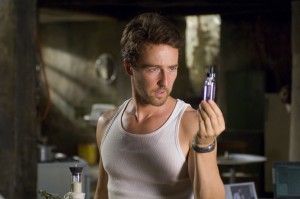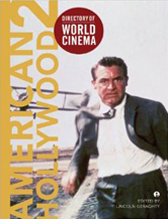
REVIEW: The Incredible Hulk
For years the comic-book industry has acted according to an unwritten rule whenever superhero storylines fall foul of fans (and sales plummet): ‘act like it never happened and start again’. It’s a strategy that Hollywood has similarly adopted in recent times in an effort to revive the struggling franchises of Batman and James Bond. Now, five years after his last big-screen appearance, the Hulk is back for a shot at re-invention.
While Ang Lee’s earlier version (The Hulk) evinced some stylistic flair, his film ultimately suffered from an under-whelming narrative, a second-rate script, average performances, and woeful CGI. It would be overstating things to say that this latest incarnation, The Incredible Hulk, succeeds in all those areas where Lee’s film failed, but at least director Louis Leterrier has learned from a few sins committed by his predecessor.
 Economically condensing elements of the Hulk’s (aka scientist Bruce Banner) back-story through its opening credits sequence, The Incredible Hulk relocates the film’s conflict to the slums of Brazil, where the fugitive Banner (Ed Norton) has taken to finding a ‘cure’ for his mean-green alter ego. It’s a clever decision on the part of the filmmakers, bypassing unnecessary exposition of the transformational Gamma-Ray experiment to focus on the character’s attempts at controlling his aggressive impulses.
Economically condensing elements of the Hulk’s (aka scientist Bruce Banner) back-story through its opening credits sequence, The Incredible Hulk relocates the film’s conflict to the slums of Brazil, where the fugitive Banner (Ed Norton) has taken to finding a ‘cure’ for his mean-green alter ego. It’s a clever decision on the part of the filmmakers, bypassing unnecessary exposition of the transformational Gamma-Ray experiment to focus on the character’s attempts at controlling his aggressive impulses.
By emphasising Banner’s internal/physiological conflict, while delaying the appearance of the ‘Hulk’, the opening sections of the film set about fostering the audience’s empathy for his character – a trait noticeably absent from the earlier film – by depicting him as a ‘human’ victim.
Indeed, The Incredible Hulk is quick to emphasise the point that Banner is no typical mad-scientist figure (Jekyll & Hyde), nor a spandex clad superhero, but the product of tragic circumstances, in which his dark-side proves more burden than benefit. Unable to channel his indestructible hyper-violence in a socially progressive way, Banner sets out to control his body, and through it, master his anger.
However, when Banner’s initial attempts at self-cure fail and the military led by General Ross (William Hurt) pick up his trail, he finds himself back in the United States, seeking assistance through his old flame and former colleague, Betty Ross (Liv Tyler)
It’s here that one of the real highlights of The Incredible Hulk – the chemistry between Norton and Tyler – comes to the fore. Eschewing any simplistic reunion between the pair, their scenes together are marked by a curious and compelling ambivalence – passion mixed with despair, longing and regret – and the performances of both actors come off as suitably heartfelt.
However, while the film manages to hold its course for most of the narrative, it’s in the more hyperbolic action scenes that its dramatic focus strays noticeably. With the exception of Hulk’s first appearance – who remains bound to the shadowy corners of a darkly lit factory like some partially hidden and uncontrollable creature from the Id – the later sequences are a stark disappointment.
In one such scene with the Hulk seemingly cornered, General Ross calls in wave after wave of personnel, artillery, machinery, and lastly an air-strike in an effort to defeat his green nemesis. The effect is much like a computer game, in which enemies are beckoned forth and dispatched one-by-one only to be replaced each time by a more challenging opponent. In these instances, the infinitely more compelling conflict that underlines Banner’s character and his relationship with Betty, are driven irretrievably into the background.
Ultimately though, even if The Incredible Hulk never quite achieves the level of a ‘smash’ hit that its comic book fans and cinemagoers deserve after Big Green’s previous outing, it still manages enough sporadic rumbles to warrant a big-screen outing.





RSS feed for comments on this post. TrackBack URI